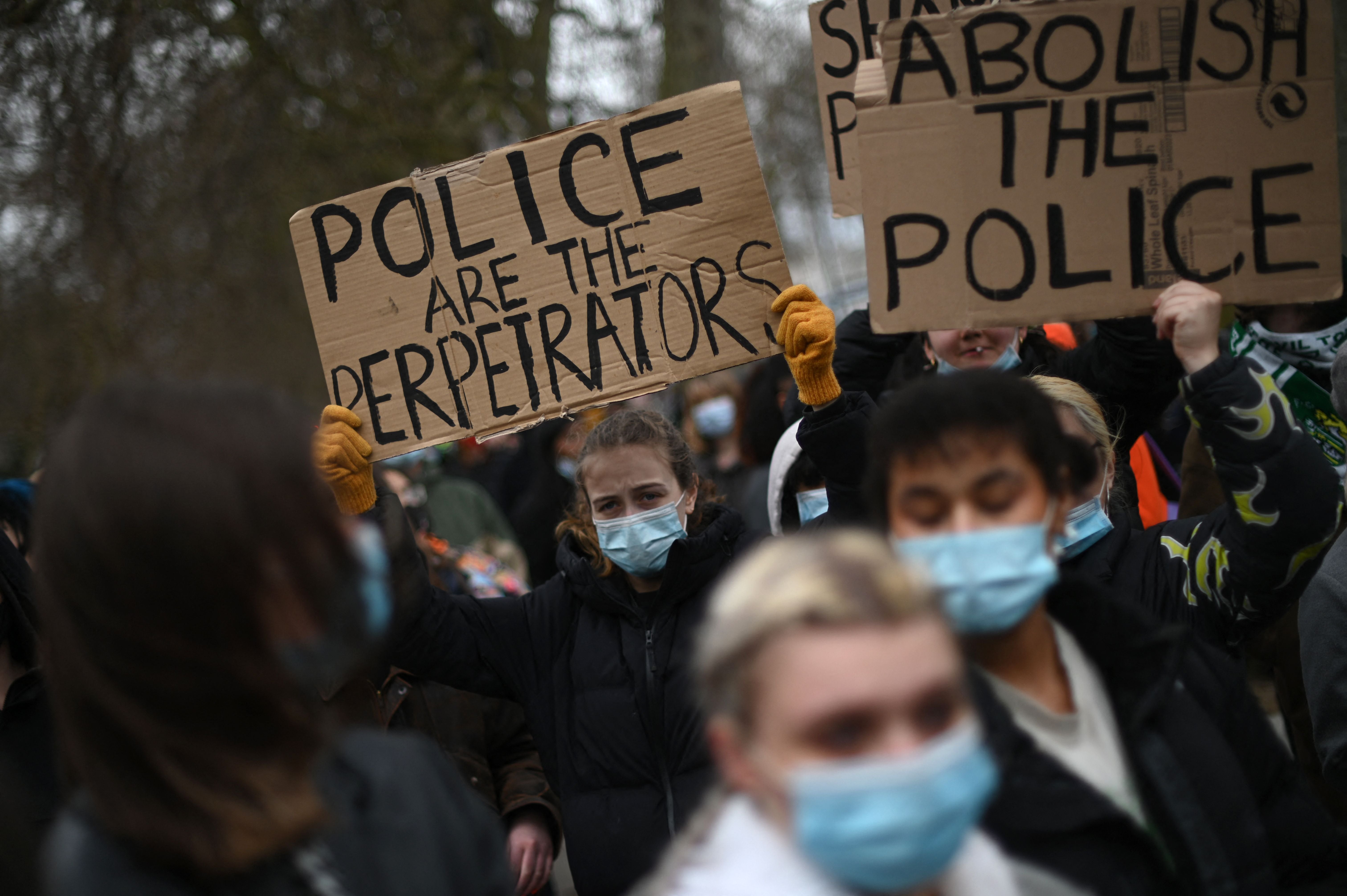The Independent's journalism is supported by our readers. When you purchase through links on our site, we may earn commission.
Why making misogyny a hate crime is not necessarily the win for women you think it is
A new ruling in a criminal justice system that is barely fit for purpose leaves little to celebrate, says Joanna Whitehead


On Wednesday night, the government announced that from autumn 2021 it would ask police forces across England and Wales to record misogyny as a hate crime. Forces will be asked to identify where a victim believes a crime has been prompted by “hostility based on their sex”.
Home Office minister Baroness Williams said that the data would initially be gathered “on an experimental basis”, pending recommendations for a longer-term solution from the Law Commission, which has conducted a review of hate crime legislation.
The landmark move – which will include instances of harassment, stalking and sexual offences – has been hailed as major progress for women’s rights, particularly in the light of renewed scrutiny around women and girls’ safety following the death of Sarah Everard.
UN Women UK, the Fawcett Society and Citizens UK all argued the change will help provide “critical data” on violence and Stella Creasy, MP for Walthamstow, who led the campaign, said: “[It] will help us better understand the scale of the problem and so be better able to prevent these crimes – it should give all women confidence that if they come forward to report crimes they will be taken seriously, too.”
Speaking to The Independent prior to the ruling, Creasy compared the change to hate crimes based on race or ethnicity: “It will be taken into account in the sentencing in court in the same way that it is if someone is being targeted because of the colour of their skin.”
On paper, it might seem that any attempt to empower women to report is a step in the right direction, but, this proposed change to UK law is not the win for women that campaigners might argue - and many people rightly presume - it is going to be.
Pilot programmes run locally have already indicated that Creasy’s comments about sentencing in court might prove to be somewhat irrelevant - given cases rarely get that far. In 2016, Nottingham Police Force introduced a new misogyny hate crime policy in the city. In the period from April 2016 to March 2018, 174 women reported misogyny hate crimes. Of these, 101 were recorded as hate incidents – when a report fails to meet the threshold for a criminal offence. Just one resulted in a conviction.
Just 1.4 per cent of rape cases resulted in a charge or summons last year
We need only look at the dismally low rates of conviction for other instances of violence against women to see systematic flaws: conviction rates for rape in England and Wales are so low that victims' commissioner Dame Vera Baird noted in her annual report that “what we are witnessing is the de-criminalisation of rape”. While cases reported to police have risen sharply over the past five years, just 1.4 per cent of rape cases resulted in a suspect being charged (or receiving a summons)in the year to March 2020.
But this isn’t just about getting cases to court - a 2018 analysis of the scheme by the University of Nottingham and Nottingham Trent University also uncovered institutionalised hurdles and cultural barriers within the very police force supposed to be enacting the pilot - particularly some officer’s failure to grasp the power and control dynamic in so much street harassment and a lack of buy-in about what constitutes misogyny.
The report claims police officers described it as “a vanity project” and a “tick box exercise”. One said: “I struggle with it in all honesty. I just think if someone wolf whistles you when you walk past a building site, ‘so what? Really?’ If someone came up to me in a gym and said, ‘you look good in your lycra’, I’d take it – ‘thanks!’ I can see where they are going with it but I feel sorry for blokes because they must be confused by what they can and can’t say”.
Another issue - which cannot be raised without highlighting the 19 per cent cut to the police budget since 2010 - included dissatisfaction with the quality and delivery of the training provided to officers. This dissatisfaction was seen in victim outcomes: in the report one woman said she was repeatedly told that misogyny was not a hate crime when reporting to the 101 police service, despite the pilot running.
I have firsthand experience working with victims of sexual and violent crime in the probation service. I also worked as a hate crime advocate for LGBTQ+ people. In my experience, and despite police protestations to the contrary, hate crime was often regarded as less serious than many other offences, which can mean that vital evidence is not gathered in a timely way and that victims are not treated with the respect or professionalism they are entitled to under the CPS Victim’s Code.
We also need to look more broadly at whether the police are ever the right people to resolve violence or combat misogyny against women
In the pilot assessment report, one woman said that police advised her to change her behaviour. She said: “One thing the police did say which I wasn’t massively pleased about, was, the female officer, right at the end she said there are some precautions that you need to take, like ‘Don’t go out on your own, don’t have our headphones in, have our phone with you’. I mean it’s all sensible stuff, but also fuck off sort of thing, but she was aware of what she was saying, that I was having to change my behaviour because of someone else.”
Beyond the findings from the pilot, we also need to look more broadly at whether the police are ever the right people to resolve violence or combat misogyny against women, when historically (and more recently) we have seen displays of gendered violence from officers themselves: in the last week alone a serving police officer was charged with Sarah Everard’s murder, and the behaviour of the Met towards women at a London vigil for Everard prompted the Mayor of London and the Home Secretary to launch an independent inquiry.
And during an interview with BBC Radio 4’s Woman's Hour on Wednesday, former chief constable of Nottinghamshire Police Susannah Fish described a “toxic culture of sexism” in significant parts of policing, adding that she would think “very carefully” about reporting a crime committed against her because of how she would be “judged”.
For many women and minority groups, this is of course old news. Black and minority ethnic women, sex workers, LGBTQ+ people, refugees, people with disabilities, travellers and others have long known that police officers are not the white knights often portrayed in popular culture. We only have to look at the treatment of Nicole Smallman and Bibaa Henry, who were stabbed to death, before Met officers attending the scene took selfies next to their lifeless bodies. The officers involved have still not been charged.
Mina Smallman, the women’s mother said: “If ever we needed an example of how toxic it has become, those police officers felt so safe, so untouchable, that they felt they could take photographs of dead black girls and send them on.”
It’s vital that we consider what a successful final outcome of such a bill might look like for women
Even if we were to overlook these concerns about tasking the police with tackling misogyny, then we also need to ask what our intended outcome is of such a bill. If it is to prevent women and girls being harassed and violated, then it’s vital we consider what a successful final outcome might look like for women - particularly when we consider the already low rates of conviction for other crimes primarily perpetrated against women victims.
Fines, community sentences and prison continue to be positioned as the natural punishment for perpetrators, but the evidence consistently fails to back up this approach. A 2019 report by the Prison Reform Trust reveals that nearly half of adults (48 per cent) are reconvicted of another offence within a year of release from prison. The remaining 52 per cent who don’t return to prison should not necessarily be seen as a success story.
And for those incidents where a perpetrator is identified and convicted of an offence, we need to think about different reparative approaches that not only reduce recidivism, but offer a more satisfying outcome for victims. A government study into restorative justice – the opportunity for victims and perpetrators to communicate about the impact an offence has had upon them and make reparations – demonstrates an 85 per cent victim satisfaction rate and a 14 per cent reduction in the frequency of reoffending. While a restorative approach may not be suitable in all cases, research indicates that such an exchange can be powerful for all involved.
As this trial period begins, we need to consider whether this will simply become more red tape that only empowers women on paper, and in reality is another paper tiger for a government under increasing scrutiny to protect women and girls. The criminal justice system is already widely acknowledged to be under-funded and under-resourced.
Instead investment is urgently required into preventative and interventionist strategies that address the ideas and attitudes of men that develop into misogynistic behaviour. While this shouldn’t come at the expense of vital services for women and girls, tackling problematic ideas around entitlement and dominance is critical in raising a new generation with more enlightened ideas around gender.
Gaining a better insight into the scale of violence and harm against women is a positive thing and enables money and resources to be invested into services for those that need them most. But working within the confines of a criminal justice service that is barely fit for purpose is no longer enough. For many, Sarah Everard’s death has acted as a catalyst for overdue conversations about violence against women and marginalised groups. Let’s not lose momentum – it’s time for action.
Join our commenting forum
Join thought-provoking conversations, follow other Independent readers and see their replies
Comments



Bookmark popover
Removed from bookmarks